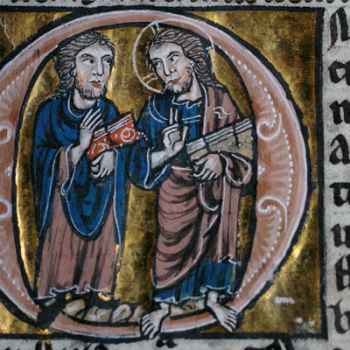
Jesus was an itinerant preacher; he went to the people so that not only would he offer them wisdom, but because be doing so he could meet them where they were at and show his solidarity with them. He gave comfort and solace to the oppressed. He healed the infirm. His message was far more than about the dangers of sin and why those who were cruel and oppressive had to change their ways: he talked about God’s love, how God wanted the best for everyone, and that he came to provide everyone the means to enter into a salvific relationship with God. He, the Word of God, lived out the words he spoke; he showed God’s care for the people in his actions in the way he would heal those who needed it. If we want to be his followers, we should do likewise. He was especially clear in saying that we must not neglect the general welfare of our neighbor, and he made sure he went around, showing everyone that he considered them his neighbor: “And Jesus went about all the cities and villages, teaching in their synagogues and preaching the gospel of the kingdom, and healing every disease and every infirmity” (Matt. 9:35 RSV).
Jesus’ words were in harmony with his actions. He taught us to love our God and our neighbor. Those who would pit helping people in need against the spread of the Gospel do not understand the Gospel. It is the good news that God loves us, that God wants the best for us. Indeed, God wants to set us free from our sins, and with that freedom, to heal our whole person. Jesus is holistic, taking care of the and the soul of those who came to him. In the incarnation, God has revealed the divine concern for us reaches all the way to our body, that our body matters, because it is a part of who we are.
Jesus’ message truly was and continues to be good news; Christians should continue to share the fullness of that good news with others, and not just a part of it. They should do so following Jesus’ example, putting their words into actions by helping those in need, such as the poor and vulnerable, instead of ignoring them and their plight. They should do so in as best a way possible – they might not be able to miraculously heal someone like Jesus was shown to do throughout the Gospels, but they can do all they can to make sure those who are sick are given the best medical care possible. If they have great wealth, they should see it was given them to share with others, to help a great number of people, and not see it as something meant for themselves alone. They certainly should not try to find excuses to ignore those in need. “We who are strong ought to bear with the failings of the weak, and not to please ourselves; let each of us please his neighbor for his good, to edify him” (Rom. 15:1-2 RSV).
If we do not edify or think about and show concern for our neighbor, if we only think about ourselves and our own inordinate desires and how we can use God to fulfill them, we have turned our back on the Gospel and the way Jesus showed us to be. He healed people out of love, and after doing so, he did not suddenly charge them a fee. He did not look down on those in need, treating them as subhumans who it would be a waste to help. Instead, as he made his way throughout the land, he would often find him himself passing by those who would ask for help, and he would give it:
And as Jesus passed on from there, two blind men followed him, crying aloud, “Have mercy on us, Son of David.” When he entered the house, the blind men came to him; and Jesus said to them, “Do you believe that I am able to do this?” They said to him, “Yes, Lord.” Then he touched their eyes, saying, “According to your faith be it done to you.” And their eyes were opened. And Jesus sternly charged them, “See that no one knows it.” But they went away and spread his fame through all that district (Matt. 9:27-31 RSV).
Jesus not only showed us the way we are to deal with those in need, he showed us the kind of humility we should have when we do so. We should not be acting out of vainglory, seeking some sort of accolade when we help others. Rather, we should do it because it is right, indeed, because we truly love our neighbor:
For Christ did not please himself; but, as it is written, “The reproaches of those who reproached thee fell on me.” For whatever was written in former days was written for our instruction, that by steadfastness and by the encouragement of the scriptures we might have hope (Rom. 15:3-4 RSV).
Those of us who call ourselves Christian, those of us who have joined ourselves to Christ in baptism, should let Christ live in us, showing everyone the love of God through us. We should learn from Jesus and how he healed those in need, how he comforted those who were sorrowing, how he warned those who would exploit the poor and needy that their way only leads to their own perdition, and use what we learn in our engagements with others. We should not be like Jesus’ critics who suggested Jesus was doing some sort of evil by helping those who needed it. We should not look to those who are poor and think poorly of them, but rather, we should see them as those who God loves, those who have been hindered by the powers that be, by the rich and powerful, from attaining their proper place in the world. We should continue to live out the Gospel and its agenda for the world. We need to help the poor and needy, the sick and the helpless, receive what they need. We need to continue preaching the truths of the Gospel, the truth of God’s love for all humanity, the truth that God wants all to be reconciled and saved together, with everyone looking after and caring for everyone else, as Paul prayed we would:
May the God of steadfastness and encouragement grant you to live in such harmony with one another, in accord with Christ Jesus, that together you may with one voice glorify the God and Father of our Lord Jesus Christ (Rom. 15:5-6 RSV).
Let us, therefore, not ignore the fullness of the Gospel. Let us live out its implications. We must help others experience the presence of Christ in the world through the way we live out our lives. We are called to represent Christ to the world, to continue his work in the ways which we can, never giving excuses as to ignore the plight of our neighbor. We are to be the salt of the earth, preserving and protecting it and all those on it from harm. Let us truly live out our faith, showing our faith with our works, proving the transformative work of grace and how it can make everyone better.
Stay in touch! Like A Little Bit of Nothing on Facebook.
If you liked what you read, please consider sharing it with your friends and family!
N.B.: While I read comments to moderate them, I rarely respond to them. If I don’t respond to your comment directly, don’t assume I am unthankful for it. I appreciate it. But I want readers to feel free to ask questions, and hopefully, dialogue with each other. I have shared what I wanted to say, though some responses will get a brief reply by me, or, if I find it interesting and something I can engage fully, as the foundation for another post. I have had many posts inspired or improved upon thanks to my readers.












